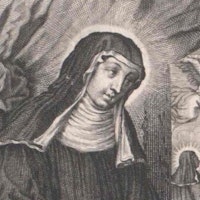I have always seen this light, in my spirit and not with external eyes, and I name it ‘the cloud of the living light.’ But sometimes I behold within this light another light which I name ‘the living light itself.’
I have always seen this light, in my spirit and not with external eyes, and I name it ‘the cloud of the living light.’ But sometimes I behold within this light another light which I name ‘the living light itself.’
Hildegard of Bingen

The Living Light
Topic: Immanence & Transcendence
From my infancy up to the present time, I now being over seventy years of age, I have always seen this light, in my spirit and not with external eyes, and I name it ‘the cloud of the living light.’ But sometimes I behold within this light another light which I name ‘the living light itself.’ And when I look upon it, every sadness and pain vanishes from my memory, so that I am again as a simple maid and not as an old woman.
Hildegard of Bingen (1098-1179) was a Benedictine abbess and mystic of medieval Germany. She was born into a noble family in Bermersheim vor der Höhe, Germany, and entered religious life at the age of eight. She received a rudimentary education, but at the age of forty-two, she began to experience a series of visions that would shape her life and work.
Hildegard described these visions as "the living light," and they were often accompanied by physical sensations such as heat, cold, and pain. She believed that these visions were a gift from God, and she felt called to share them with the world. She began to write down her visions, and she also composed music and poetry to express her spiritual insights.
Hildegard was a prolific writer, and her works cover a wide range of topics, including theology, natural science, medicine, and music. She is best known for her three volumes of visionary theology: Scivias, Liber Vitae Meritorum, and Liber Divinorum Operum. These works are rich in symbolism and imagery, and they offer a unique perspective on the nature of God, the human soul, and the world.
In addition to her writings, Hildegard was also a gifted musician and composer. She wrote over 70 songs, including the Ordo Virtutum, an early example of liturgical drama. Her music is characterized by its simple melodies and its use of plainchant.
Hildegard was a complex and multifaceted figure, and her work continues to inspire and challenge people today. She was a visionary, a mystic, a writer, a composer, a scientist, and a healer. She was also a woman of great courage and determination, and she used her gifts to make a difference in the world.
Hildegard of Bingen was a remarkable woman who left a lasting legacy. She was a pioneer in the fields of theology, natural science, and music, and her work continues to be studied and appreciated today. She was also a powerful voice for women's rights, and she challenged the patriarchal structures of her time. Hildegard of Bingen was a true visionary, and she continues to inspire us with her courage, her intellect, and her creativity.
Bingen, Hildegard of. [Ford-Grabowsky, Mary. Prayers for All People. Hildegard of Bingen. Doubleday, 1995].

Hildegard of Bingen
Theme: Everyday Divinity

About This Hildegard of Bingen Quotation [Commentary]
Hildegard of Bingen describes a lifelong experience of a light seen “in my spirit and not with external eyes.” She names this vision “the cloud of the living light,” a phrase that holds both clarity and mystery. It is “always” with her, not as a passing moment but as a constant inner presence “from my infancy up to the present time.” The term “cloud” suggests a luminous presence that is real yet not fully graspable. This is not a vision sought out or summoned—it simply abides, unceasing and interior.
Within this “cloud of the living light,” Hildegard sometimes beholds “another light,” which she calls “the living light itself.” This second light appears within the first, offering a deeper encounter that is both intimate and renewing. “When I look upon it,” she writes, “every sadness and pain vanishes from my memory,” and she becomes “again as a simple maid and not as an old woman.” The experience is not abstract; it restores her to a state of inner freedom, as if time and suffering have been lifted. The divine presence, seen in this inner light, does not merely reveal—it also heals.
This vision reflects what may be called everyday divinity. Hildegard does not speak of a singular revelation, but of a presence known “from my infancy” and continuing into her seventies. Her words name a divine reality that is both near and beyond: the “cloud” that holds her daily awareness, and the “living light itself” that sometimes shines forth within it. In this layered light, we glimpse a relationship with the divine that is enduring, personal, and quietly transformative.
Eknath Easwaran, Hildegard of Bingen
Richard Rohr, Hildegard of Bingen, Scivias [Excerpted from his commentary]
Visionary theology [Excerpt]
Additional Hildegard of Bingen Quotes
Resources
Related Quotes
Copyright © 2017 – 2026 LuminaryQuotes.com About Us